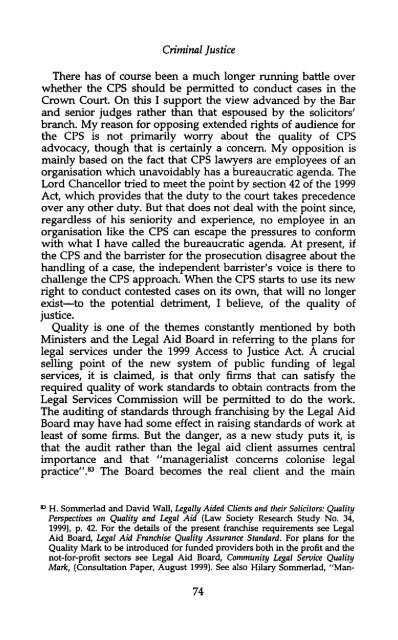HAMLYN - College of Social Sciences and International Studies ...
HAMLYN - College of Social Sciences and International Studies ...
HAMLYN - College of Social Sciences and International Studies ...
You also want an ePaper? Increase the reach of your titles
YUMPU automatically turns print PDFs into web optimized ePapers that Google loves.
Criminal Justice<br />
There has <strong>of</strong> course been a much longer running battle over<br />
whether the CPS should be permitted to conduct cases in the<br />
Crown Court. On this I support the view advanced by the Bar<br />
<strong>and</strong> senior judges rather than that espoused by the solicitors'<br />
branch. My reason for opposing extended rights <strong>of</strong> audience for<br />
the CPS is not primarily worry about the quality <strong>of</strong> CPS<br />
advocacy, though that is certainly a concern. My opposition is<br />
mainly based on the fact that CPS lawyers are employees <strong>of</strong> an<br />
organisation which unavoidably has a bureaucratic agenda. The<br />
Lord Chancellor tried to meet the point by section 42 <strong>of</strong> the 1999<br />
Act, which provides that the duty to the court takes precedence<br />
over any other duty. But that does not deal with the point since,<br />
regardless <strong>of</strong> his seniority <strong>and</strong> experience, no employee in an<br />
organisation like the CPS can escape the pressures to conform<br />
with what I have called the bureaucratic agenda. At present, if<br />
the CPS <strong>and</strong> the barrister for the prosecution disagree about the<br />
h<strong>and</strong>ling <strong>of</strong> a case, the independent barrister's voice is there to<br />
challenge the CPS approach. When the CPS starts to use its new<br />
right to conduct contested cases on its own, that will no longer<br />
exist—to the potential detriment, I believe, <strong>of</strong> the quality <strong>of</strong><br />
justice.<br />
Quality is one <strong>of</strong> the themes constantly mentioned by both<br />
Ministers <strong>and</strong> the Legal Aid Board in referring to the plans for<br />
legal services under the 1999 Access to Justice Act. A crucial<br />
selling point <strong>of</strong> the new system <strong>of</strong> public funding <strong>of</strong> legal<br />
services, it is claimed, is that only firms that can satisfy the<br />
required quality <strong>of</strong> work st<strong>and</strong>ards to obtain contracts from the<br />
Legal Services Commission will be permitted to do the work.<br />
The auditing <strong>of</strong> st<strong>and</strong>ards through franchising by the Legal Aid<br />
Board may have had some effect in raising st<strong>and</strong>ards <strong>of</strong> work at<br />
least <strong>of</strong> some firms. But the danger, as a new study puts it, is<br />
that the audit rather than the legal aid client assumes central<br />
importance <strong>and</strong> that "managerialist concerns colonise legal<br />
practice". 83 The Board becomes the real client <strong>and</strong> the main<br />
83 H. Sommerlad <strong>and</strong> David Wall, Legally Aided Clients <strong>and</strong> their Solicitors: Quality<br />
Perspectives on Quality <strong>and</strong> Legal Aid (Law Society Research Study No. 34,<br />
1999), p. 42. For the details <strong>of</strong> the present franchise requirements see Legal<br />
Aid Board, Legal Aid Franchise Quality Assurance St<strong>and</strong>ard. For plans for the<br />
Quality Mark to be introduced for funded providers both in the pr<strong>of</strong>it <strong>and</strong> the<br />
not-for-pr<strong>of</strong>it sectors see Legal Aid Board, Community Legal Service Quality<br />
Mark, (Consultation Paper, August 1999). See also Hilary Sommerlad, "Man-<br />
74

















